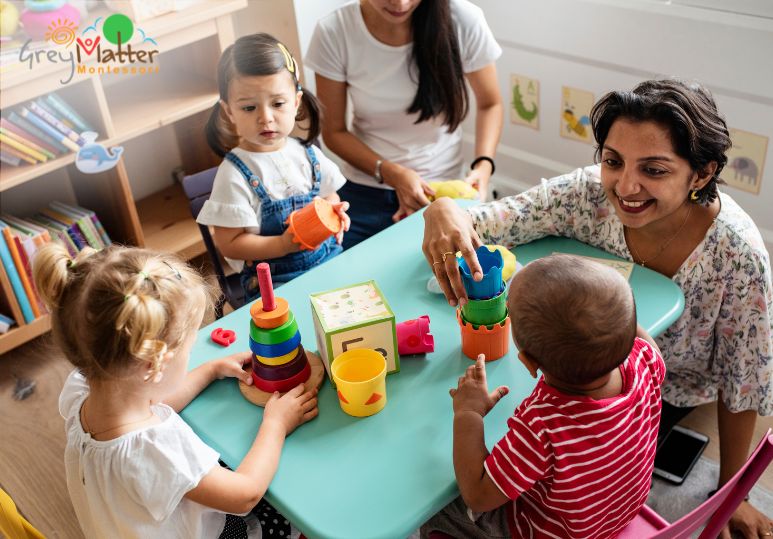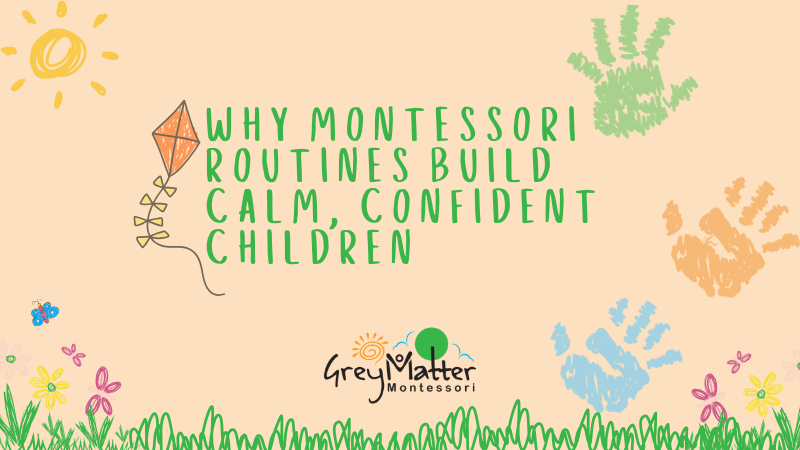Choosing the right educational approach for your child is an important decision, especially during the formative preschool and kindergarten years. At Grey Matter Montessori we believe that hands-on learning is a crucial aspect of early childhood education. The Montessori method prioritizes experiential learning, encouraging children to explore, engage, and understand concepts through direct interaction with their environment. In this blog, we’ll explore the benefits of hands-on learning in a Montessori setting and how it shapes young learners for future success.
1. Encouraging Active Participation
In traditional classrooms, children often passively receive information through lectures and worksheets. In contrast, the Montessori approach emphasizes active participation. Through hands-on activities, children learn by doing, which helps them better retain information and build meaningful connections between concepts.
At Grey Matter Montessori, children work with materials designed to be manipulated—whether it’s counting beads for math or sandpaper letters for language development. These materials engage multiple senses, encouraging children to take an active role in their learning. This kind of active involvement fosters curiosity and a natural desire to learn, which is essential for long-term academic success.
2. Fostering Independence and Confidence
Hands-on learning in a Montessori environment also promotes independence. Children are given the freedom to choose their own activities and work at their own pace. By allowing children to make decisions about what they want to explore, they develop a sense of autonomy and self-motivation.
For example, in our classrooms at Grey Matter Montessori, children are encouraged to independently choose learning activities that match their interests and developmental stage. This freedom helps them take ownership of their learning, which builds their confidence. As they successfully complete tasks on their own, their sense of competence and self-esteem grows.
3. Enhancing Problem-Solving and Critical Thinking Skills
One of the key benefits of hands-on learning is the development of problem-solving and critical thinking skills. In a Montessori environment, children are encouraged to experiment, make mistakes, and find solutions through trial and error. This approach allows them to become active problem-solvers, rather than relying on adults for answers.
At Grey Matter Montessori, children often work with open-ended materials that encourage exploration and inquiry. Whether it’s figuring out how to build a structure with blocks or solving a puzzle, children learn to think critically, evaluate their options, and persist through challenges. These problem-solving experiences are valuable not only for academic success but for life skills that will benefit them in various aspects of their future.
4. Promoting Fine and Gross Motor Skills
Hands-on learning also supports the development of both fine and gross motor skills. From handling small objects like puzzle pieces to engaging in larger movements like arranging items on shelves, children develop important physical skills that contribute to their overall growth and coordination.
For example, at Grey Matter Montessori, practical life activities such as pouring, scooping, and buttoning clothes help children refine their fine motor skills. These tasks may seem simple but are essential for building hand-eye coordination and preparing children for tasks like writing. Gross motor skills are also enhanced through activities like outdoor play, where children have the freedom to run, jump, and climb.
5. Cultivating a Love for Learning
One of the most lasting benefits of hands-on learning in a Montessori setting is the cultivation of a lifelong love for learning. By allowing children to explore topics that interest them, engage with materials directly, and make connections through hands-on experiences, Montessori education fosters a sense of joy and curiosity about the world.
At Grey Matter Montessori, we strive to create an environment where children are excited to come to school each day and eager to learn. Hands-on learning allows them to feel the satisfaction of discovery, which motivates them to continue exploring new ideas and concepts. This intrinsic love for learning is a key factor in future academic and personal success.
6. Strengthening Social Skills and Cooperation
While Montessori education emphasizes independence, it also promotes social skills and cooperation. Many hands-on activities in our classrooms encourage collaboration, where children work together to solve problems or complete tasks. This interaction helps them develop communication skills, empathy, and the ability to work as part of a team.
For instance, at Grey Matter Montessori, children often engage in group projects that require cooperation and shared responsibilities. Through these experiences, they learn to listen to others, share ideas, and compromise—important social skills that will serve them throughout their lives.
Building a Strong Foundation for Future Success
Hands-on learning in a Montessori environment offers countless benefits for young children. At Grey Matter Montessori, serving communities like Carrington, Nolan Hill, Sage Hill, Evanston, and more, we are committed to fostering an educational experience that encourages active participation, independence, problem-solving, and a love for learning. Through hands-on exploration and direct engagement with materials, children develop the critical skills they need to succeed academically, socially, and emotionally. If you're looking for an enriching and supportive environment for your child, Grey Matter Montessori is here to provide a strong foundation for lifelong learning and development. Call us for more information!
FAQs
Q: How does Montessori promote independence?
A: Children choose their own activities and work at their own pace, fostering decision-making, responsibility, and self-motivation.
Q: What role do teachers play in Montessori hands-on learning?
A: Teachers guide and support, allowing children to explore independently while providing individualized attention when needed. Call us for more information about our teachers.
Q: Can hands-on learning be applied to all subjects?
A: Yes, Montessori uses hands-on techniques for subjects like math, language, science, and practical life skills.






